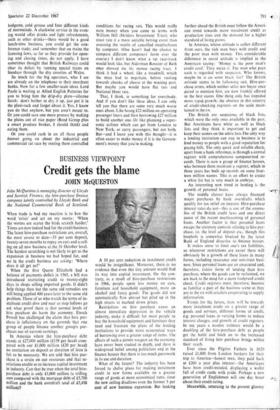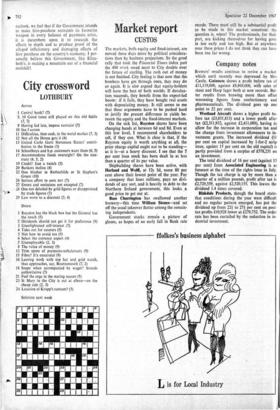Credit gets the blame
BUSINESS VIEWPOINT JOHN McQUESTON
John McQueston is managing director of Lloyds and. Scottish Finance, the hire-purchase finance company jointly controlled by Lloyds Bank and the National Commercial Bank of Scotland.
When trade is bad my reaction is to ban the word 'crisis' and act on my motto : 'When the worms are scarce the birds scratch harder.' Times are now indeed bad for the credit business. The latest hire-purchase restrictions are, overall, the most severe to date-33 per cent deposit, twenty-seven months to repay on cars and a ceil- ing on all new business at,the 31 October level. The hardest scratching is not likely to get us the expansion in business we had hoped far, and we in the credit business are asking : 'Where does it all get us?'
When the first Queen Elizabeth had a balance of payments deficit in 1563, a bill was introduced restricting credit to twenty-eight days in shops selling imported goods. It didn't help things then but the same old remedies are still being applied 400 years later to the same old problem. Those of us who watch the terms of in- stalment credit dive and soar as stop follows go ask what proof there is that normal levels of hire purchase do harm the economy. Enoch Powell has challenged the claim that-hire pur- chase is inflationary on the grounds that one group of people finance another group's pur- chases out of current earnings.
In America where the, hire-purchase debt stands at £27,000 million (£139 per head) com- pared with our £1,000 million (£20 per head) no restriction on deposit or duration of loan is felt. to be necessary. We are told that hire pur- chase is a strain on our resources and that•re- strictions enable us to increase capital investment in industry. Can that be true when the total hire- Purchase debt is only £1,000 million (a trifling sum compared with the mortgage debt of £5,700 million and the bank overdraft total of £5,450 million)? A 10 per cent reduction in instalment credit would be insignificant. Moreover, there .is no evidence that even this tiny amount would find its way into capital investment. On the con- trary, as a result of hire-purchase restrictions in 1966, people spent less money on cars, furniture and household equipment, more on alcohol and fancy goods. The goods did not automatically flow abroad but piled up in the high streets at marked down prices.
Restrictions on hire purchase cause an almost immediate depression in the vehicle industry, make it difficult for most people to buy the household equipment and furniture they need and frustrate the plans of the lending institutions to provide more economical ways of borrowing over a greater range of items. The effects of such-a potent weapon on the economy have never been studied in depth, and there is widespread belief among politicians and in the finance houses that there is too much guesswork in its use and duration.
What of the future? The industry has been forced to shelve plans for making instalment credit in new forms available on a greater range of goods at more economical rates, since the new ceiling disallows even the former 5 per cent of new business expansion. But looking further ahead the British must follow the Ameri- can trend towards more instalment credit as production rises and the demand for a higher standard of living grows.
In America, whose attitude is rather different from ours, the rich man buys with credit and the poor man with money. This considerable difference in social attitude is implied in the American saying: 'Money is the poor man's credit card.' They mean it. The man who pays cash is regarded with suspicion. Who knows, maybe he is on some black list? The British attitude seems to be following suit. Hire-pur- chase terms, which neither seller nor buyer once dared to mention first, are now frankly offered in the best stores. One thing only has impeded more rapid growth; the absence in this country of credit-checking registers on the scale main- tained in the us.
The British are suspicious of black lists, which were the only ones available in the past. But Americans have white as well as black lists and they think it important to get and keep their names on the white lists.The only way a lending institution can stay in business is to lend money to people with a good reputation for paying bills. The only quick and reliable check, apart from a bank reference, is through a central register with comprehensive computerised re- cords. There is now a group of finance houses, who between them maintain a register, which in three years has built up records on some four- teen million names. This is an effort to create a white list but is very much in embryo.
An interesting new trend in lending is the growth of personal loans.
The middle classes' have always financed 'gel" major purchases by bank overdrafts which qualify for tax relief on interest. Hire-purchase interest rates do not—this is one of the anoma- lies of the British credit laws and one direct cause of the recent mushrooming of personal loans. Another factor is that personal loans escape the statutory controls relating to hire pur- chase, i.e. the level of deposit etc., though this loophole is somewhat blocked by the latest Bank of England directive to finance houses.
It makes sense to limit one's tax liabilities, so whenever restrictions are easier there will obviously be a growth of these loans in many forms, including insurance and unit-trust busi- ness. Since personal loans are an unsecured and, therefore, riskier form of lending than hire purchase, where the goods can be reclaimed, we are back to the need for a more foolproof credit check. Credit registers must, therefore, become as familiar a part of the business scene as they are in the us with retailers cooperating to supply information.
Trends for the future, then, will be towards more instalment credit on a greater range of goods and services, different forms of credit, e.g. personal loans in varying forms to reduce interest charges, and growth of credit registers. In ten years a modest estimate would be a doubling of the hire-purchase debt as people get the habit and latch on to the increased standard of living hire purchase brings within their reach.
Ever since the Pilgrim Fathers in 1620 raised £1,800 from London bankers for their trip to America—honest men, they paid back at £200 a year plus interest—the Americans have been credit-minded, displaying a wallet full of credit cards with pride. Perhaps a new generation of Englishmen will one day boast about their credit rating.
Meanwhile, returning to the present gloomy outlook, we feel that if the Government intends to make hire-purchase restraints its favourite weapon in every balance of payments crisis, it is incumbent upon it to research the effects in depth and to produce proof of the alleged inflationary and damaging effects of hire purchase on the country's economy. I per- sonally believe this Government, like Eliza- beth's, is making a mountain out of a financial molehill!,



































 Previous page
Previous page